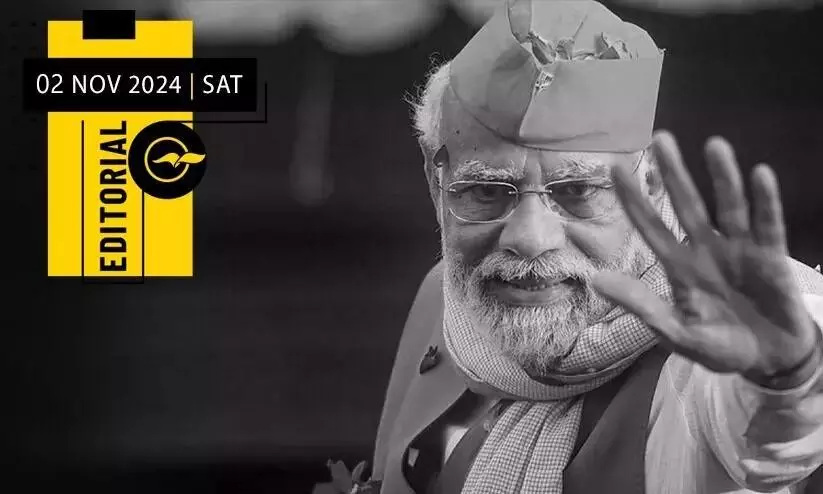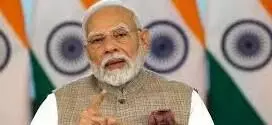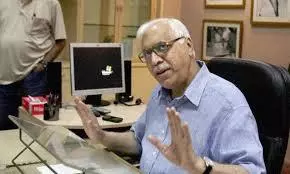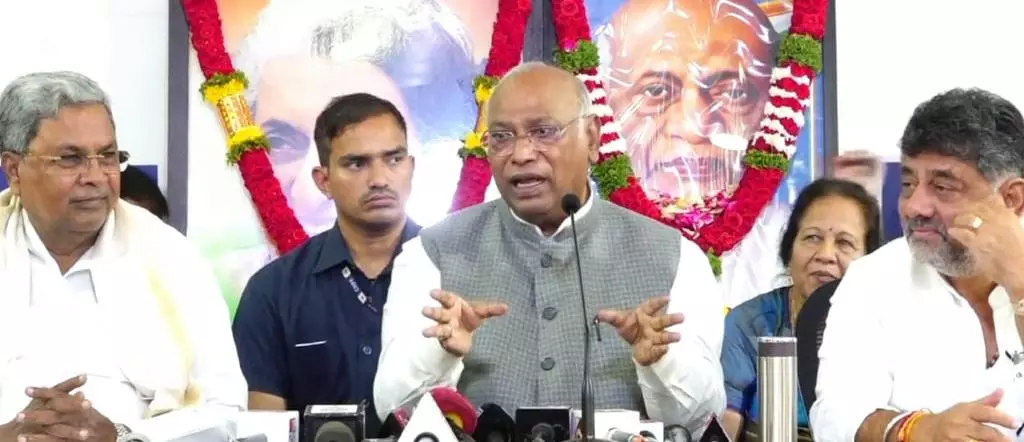
Through oneness to autocracy
text_fieldsPrime Minister Narendra Modi has reiterated the central government's stance on uniform civil code and simultaneous elections. While addressing the birth centenary celebration of Sardar Vallabhai Patel in Vadodara, Gujarat, he said that his government will implement a uniform civil code across the country and make the 'one country one election' policy a reality, just as it implemented the the unified Goods and Services Tax (GST), one country one ration card and Ayushman Bharat. He said that at the heart of this decision is Patel's message of unity of the people and the government aims to strengthen unity among the people removing discrimination. He strongly criticized the opposition without naming it, saying that those who constantly talk about the constitution and democracy do not think in this way and they try to divide the society and thereby the country.
In a sense, the Vadodara speech is a repetition of Modi's last Independence Day speech. One of Sangh Parivar's stated agendas is a uniform civil code. They see 'One election' as a way to overcome anti-people sentiments and stay in power. No wonder that the Sangh Parivar, the avowed champions of an ideology of extermination and racist politics, have announced that they will implement them. Back in June 2023, when the 22nd Law Commission issued a notification seeking public opinion on the Uniform Civil Code, things were amply clear: after the Hindutva agenda of removing Kashmir's special status and building a Ram Temple, the message of that notification was that they were going to implement a Uniform Civil Code.
Since the 21st Law Commission had observed that the Uniform Civil Code was 'neither necessary nor desirable' at the time, no urgent situation has emerged in the country warranting its being brought up again. That Commission did impress on the government that in India, the largest country with thousands of castes, tribals and followers of diverse religions living harmoniously, it is not practical to bracket them all in the same mould. But then the government rejected this entirely and formed the 22nd Law Commission including only those who were sure to submit a report in line with the government's wishes. And the Commission submitted its recommendation in favour of a single civil code. All these measures were calculated to win more than 400 seats in parliament and return to power for the third time in the subsequent Lok Sabha elections, putting up agendas such as Ram Temple and similar goals.
But they erred in their electoral calculation and ended up in a situation so that if the government is to continue, it would be at the mercy of its allies. As for the opposition, they cannot be ignored as they were in the past. In this background, the general expectation was that they would stay away from agendas like the Uniform Civil Code, at least for the time being. However, the message that came later was that they are vowed to complete their agenda through devious ways. And the last Independence Day speech was its 'inaugural' speech. What the prime minister said at that time was not that the government would introduce a Uniform Civil Code would be introduced, but that they will bring in a 'secular civil code'.
Modi's rationale is that the current personal laws are 'communal' and therefore there is a need for 'secular' civil laws. He clarified that what they have introduced is a secular common civil code and it will be implemented. However, this statement became a big controversy. The opposition and various democratic organizations criticized Modi for belittling leaders like Ambedkar, who introduced the Uniform Civil Code. Modi, who ignored those criticisms, has again come forward with the same expression. The new term also has the advantage of weakening the potential for critical narratives of the term 'uniform civil code' and further aligning the ultra-rightists like the neo-atheist/rationalist school with the Sangh Parivar - although the effect of both is the same.
The declaration that the government will not backtrack from the decision of 'one country, one election', which ensures the power of Hindutva ideology, cannot be taken lightly either. The slogan of 'One Election' has the potential to destroy the country's federal power structure from within. Recognizing this reality, resolutions against it were passed by many including the Kerala Legislative Assembly. As for the argument that simultaneous election will save money for the exchequer, it does not hold water: while other straightforward means are available to reduce expenditure and streamline governance, one need not be in any doubt that this is an anti-democratic measure that undermines the rights of states and local self-government bodies and challenges the sovereignty of the people.
Indications have also started coming that the Sangh Parivar is trying to use the census process for its continuance in power. The planned delimitation of parliament based on the census is part of this design. The clever moves to gain power by reducing the number of parliamentary seats in the south where they have less strength, and increasing the seats in UP by more than 30, need to be read in this context. In short, the Sangh Parivar is going ahead with its agenda even though its strength in the Parliament has decreased for the time being. The main question is how defenders of democracy, including the opposition, will take on such moves.


























